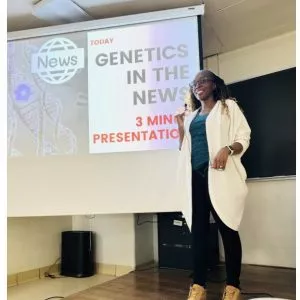Dr. Jedy C
Research Mentor
Dr. Jedy serves as a Research Mentor for Rising Researchers, where she designs and leads research camps and one-on-one experiences. She earned her Ph.D. in Biochemistry and Molecular Biology from UMass Amherst. Her research work with students focuses on Bioinformatics, Machine Learning, and Artificial Intelligence. Dr. Jedy adopts an open and inclusive approach, collaborating with students to define their research and career goals, equipping them with the skills and opportunities to advance their education and future aspirations.
Location:
West Springfield, Massachusetts
Education:
Ph.D., Biochemistry and Molecular Biology, Plant Biology Program, University of Massachusetts Amherst
MSc., Biology, East Tennessee State University
BSc., Microbiology, University of Zambia
Bio:
Dr. Jedy is a lecturer at the University of Massachusetts (UMass) Amherst, where she earned her Ph.D. in the Biochemistry and Molecular Biology Department and Plant Biology Program. Her doctoral research utilized CRISPR/Cas9 genome editing, Bioinformatics, and Microbiology techniques to explore the role of beneficial bacteria-plant interactions in sustainable agriculture. As an educator and mentor, Dr. Jedy has taught and guided students in Biology, Genetics, Microbiology, and laboratory research, fostering success among undergraduate and high school students from diverse backgrounds.
She is recognized for her impactful teaching and mentorship with prestigious awards, including the 2023 K. Patricia Cross Future Leaders Award in Higher Education and the BLOOME Teaching Grant from the American Society of Plant Biologists. Her mentees frequently advance to biotech internships, medical school, or graduate programs. Passionate about mentorship, Dr. Jedy is the CEO and founder of J&S Mentoring Network LLC in the USA and co-founder of JUSENIOR Mentoring Institute in Zambia.
Dr. Jedy’s Research Focus:
- CRISPR/Cas9 Genome Editing
- Genetics and Bioinformatics
- Microbiology/bacteria-plant Interactions
- STEM Education
Dr. Jedy’s Teaching Activity:
Dr. Jedy’s Scholarly Activity:





